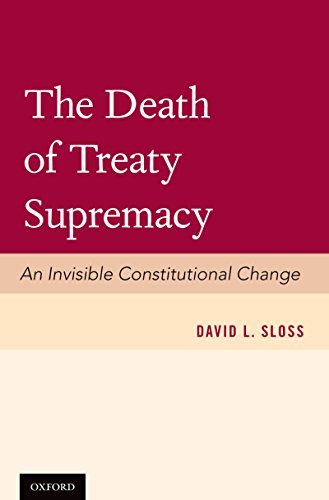New from Oxford University Press: (Oct. 2016), by
David L. Sloss (Santa Clara University - School of Law). A description from the Press:
This book provides the first detailed history of the Constitution's
treaty supremacy rule. It describes a process of invisible
constitutional change. The traditional supremacy rule provided that all
treaties supersede conflicting state laws; it precluded state
governments from violating U.S. treaty obligations. Before 1945, treaty
supremacy and self-execution were independent doctrines. Supremacy
governed the relationship between treaties and state law. Self-execution
governed the division of power over treaty implementation between
Congress and the President. In 1945, the U.S. ratified the UN Charter,
which obligates nations to promote human rights "for all without
distinction as to race." In 1950, a California court applied the
Charter's human rights provisions and the traditional treaty supremacy
rule to invalidate a state law that discriminated against Japanese
nationals. The implications were shocking: the decision implied that the
United States had effectively abrogated Jim Crow laws throughout the
South by ratifying the UN Charter. In response, conservatives mobilized
support for a constitutional amendment, known as the Bricker Amendment,
to abolish the treaty supremacy rule. The amendment never passed, but
Bricker's supporters achieved their goals through de facto constitutional change. The de facto
Bricker Amendment created a novel exception to the treaty supremacy
rule for non-self-executing (NSE) treaties. The exception permits state
governments to violate NSE treaties without authorization from the
federal political branches. The death of treaty supremacy has
significant implications for U.S. foreign policy and for U.S. compliance
with its treaty obligations.
A few blurbs of note:
"The Death of Treaty Supremacy makes a major contribution to
our understanding of American constitutionalism. It demonstrates the
evolutionary nature of constitutional law, identifies the complex
practical forces that drive its evolution, and highlights yet another
flaw in constitutional 'originalism.' It shows that historical changes
have transformed the Constitution's meaning even on an issue where the
'original' meaning was actually clear and specific--that properly
ratified treaties are 'supreme' over state law." -Edward A. Purcell Jr.
"David
Sloss has written a fascinating case study on a central constitutional
queýstion - how does the interpretation of the constitution change?
Moreover, Sloss has taken as his example a pressing issue of
contemporary constitutional debate- the role of treaties as domestic law
in state and federal courts. His fine-grained and wide-reaching
research and his thoughtful analysis benefits us all." -Judith Resnik
The introduction is available
here, on SSRN.
